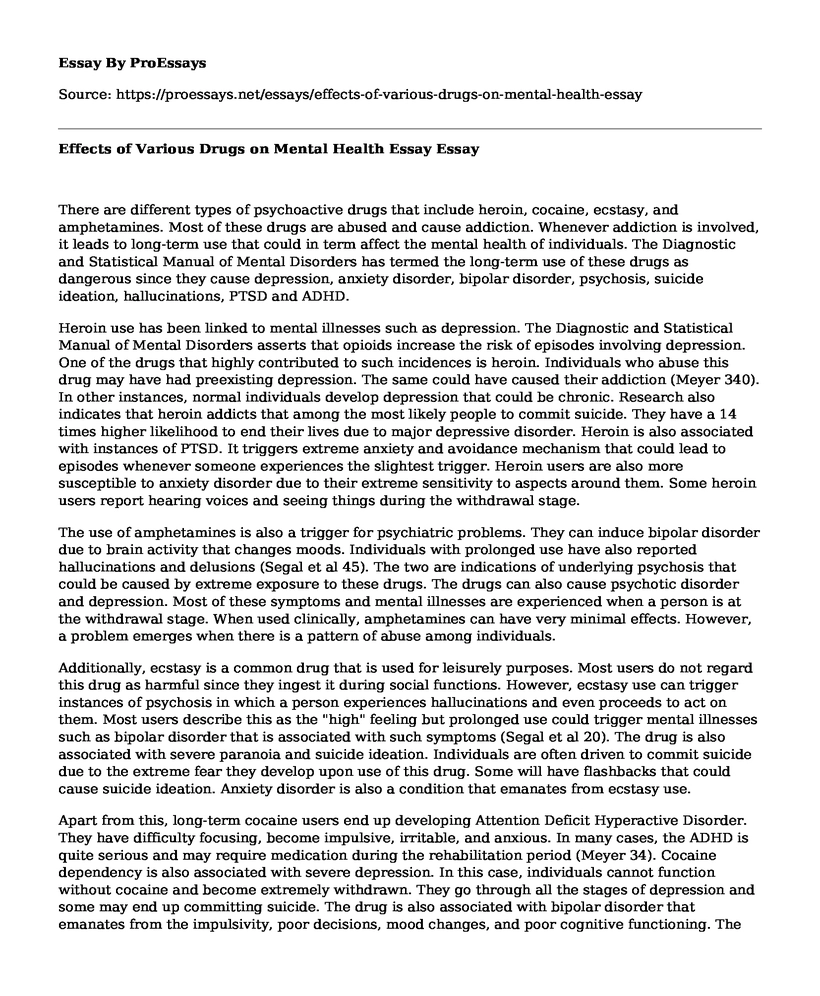There are different types of psychoactive drugs that include heroin, cocaine, ecstasy, and amphetamines. Most of these drugs are abused and cause addiction. Whenever addiction is involved, it leads to long-term use that could in term affect the mental health of individuals. The Diagnostic and Statistical Manual of Mental Disorders has termed the long-term use of these drugs as dangerous since they cause depression, anxiety disorder, bipolar disorder, psychosis, suicide ideation, hallucinations, PTSD and ADHD.
Heroin use has been linked to mental illnesses such as depression. The Diagnostic and Statistical Manual of Mental Disorders asserts that opioids increase the risk of episodes involving depression. One of the drugs that highly contributed to such incidences is heroin. Individuals who abuse this drug may have had preexisting depression. The same could have caused their addiction (Meyer 340). In other instances, normal individuals develop depression that could be chronic. Research also indicates that heroin addicts that among the most likely people to commit suicide. They have a 14 times higher likelihood to end their lives due to major depressive disorder. Heroin is also associated with instances of PTSD. It triggers extreme anxiety and avoidance mechanism that could lead to episodes whenever someone experiences the slightest trigger. Heroin users are also more susceptible to anxiety disorder due to their extreme sensitivity to aspects around them. Some heroin users report hearing voices and seeing things during the withdrawal stage.
The use of amphetamines is also a trigger for psychiatric problems. They can induce bipolar disorder due to brain activity that changes moods. Individuals with prolonged use have also reported hallucinations and delusions (Segal et al 45). The two are indications of underlying psychosis that could be caused by extreme exposure to these drugs. The drugs can also cause psychotic disorder and depression. Most of these symptoms and mental illnesses are experienced when a person is at the withdrawal stage. When used clinically, amphetamines can have very minimal effects. However, a problem emerges when there is a pattern of abuse among individuals.
Additionally, ecstasy is a common drug that is used for leisurely purposes. Most users do not regard this drug as harmful since they ingest it during social functions. However, ecstasy use can trigger instances of psychosis in which a person experiences hallucinations and even proceeds to act on them. Most users describe this as the "high" feeling but prolonged use could trigger mental illnesses such as bipolar disorder that is associated with such symptoms (Segal et al 20). The drug is also associated with severe paranoia and suicide ideation. Individuals are often driven to commit suicide due to the extreme fear they develop upon use of this drug. Some will have flashbacks that could cause suicide ideation. Anxiety disorder is also a condition that emanates from ecstasy use.
Apart from this, long-term cocaine users end up developing Attention Deficit Hyperactive Disorder. They have difficulty focusing, become impulsive, irritable, and anxious. In many cases, the ADHD is quite serious and may require medication during the rehabilitation period (Meyer 34). Cocaine dependency is also associated with severe depression. In this case, individuals cannot function without cocaine and become extremely withdrawn. They go through all the stages of depression and some may end up committing suicide. The drug is also associated with bipolar disorder that emanates from the impulsivity, poor decisions, mood changes, and poor cognitive functioning. The onset of bipolar disorder among cocaine users is similar to that of non-drug users who have the condition.
Works Cited
Mayer, Felix P., et al. "Application of a combined approach to identify new psychoactive street drugs and decipher their mechanisms at monoamine transporters." Neuropharmacology of New Psychoactive Substances (NPS). Springer, Cham, 2016. 333-350.
Segal, Bernard, George J. Huba, and Jerome L. Singer. Drugs, daydreaming, and personality: A study of college youth. Routledge, 2018.
Cite this page
Effects of Various Drugs on Mental Health Essay. (2022, Sep 22). Retrieved from https://proessays.net/essays/effects-of-various-drugs-on-mental-health-essay
If you are the original author of this essay and no longer wish to have it published on the ProEssays website, please click below to request its removal:
- Violence in Downtown Los Angeles Essay
- The Gaps Between Female and Male Sexual Assaults and Rape Perpetrators
- Why the Statement "All Lives Matter" is Problematic to "Black Lives Matter" Essay
- Rosa Parks vs. Harriett Tubman: Compare and Contrast Essay
- Essay Sample on Gender Notions and Stereotypes That Men Are Stronger Than Women Are False
- U.S. Marijuana Use: Federal vs. State Laws - Research Paper
- Enhancement of Interaction: Countering Social Isolation & Depression - Essay Sample







